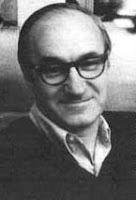
How does a leader motivate followers? There are many theories of motivation but most recently I've been studying the writings of Albert Bandura. In an article entitled, "Human Agency in Social Cognitive Theory" (1989) Bandura argues for what he calls "social cognitive theory" as the prime motivation for self-generated activities. (Whew! That's a mouthful.)
Let me break it down a little bit. "Self-generated activities" are those things which an individual chooses to engage in. It may be church attendance, a hobby, a course of study in continuing education, attending discipleship classes, etc. There are three schools of thought as to why people choose the activities that they choose. The first school of thought is the "autonomous agency" perspective. This view sees all humans as free moral agents who can make any choice they want to, and they can do so independently of the influence of their environment upon them. Many religious traditions call this free-will and have little patience with people who don't make quality decisions for their own lives. It is, according to this view, always their choice.
The second school of thought, "mechanical agency" sees the environment as the deciding influence. How we are raised, where we are raised, the culture we are born into, our race, ethnicity, socio-economic class, etc. all combine to shape our worldview and all our decisions will emerge from that worldview. Further, we have no control over these influencing environmental factors. That's why Christian nations have more Christians, and Muslim nations have more Muslims. That's why poor people tend to live in economically depressed areas for generations. The Proverb tells us that if we raise up a child in the way that he should go, when he is old, he will not depart from it (Prov. 22:6).
Bandura proposes "emergent interactive agency" as the best model for understanding one's motivation for engaging in specific self-generated activities. According to Bandura, "Persons are neither autonomous agents nor simply mechanical conveyors of animating environmental influences. Rather, they make causal contribution to their own motivation and action within a system of triadic reciprocal causation" (p. 1175). In other words, the choices that one makes emerges from a continuous stream of experiences and how those experiences are processed in out thinking (cognitive process). For example, a poor child may choose to attend a class on economics because he wants to know why he has grown up poor. As he understands the process better, he now thinks of ways to improve his economic condition. As he begins to gain more wealth, he learns to invest until he is wealthy. Where he is now has emerged from an interaction between his thinking, his actions, and his changing environment.
According to Bandura people are motivated first by what they believe they can do. If they believe that they can accomplish something, even though it may come in the face of great obstacles, they will endure to see it through. If, however, a person does not believe that he or she can accomplish anything, than they are not likely to invest even minimal effort or energy to accomplish it. In the illustration above, the child may never initially have believed that he could be rich, but he may have believed that could pass that class. This then, led to a chain of events that changed his thinking, and changed his life.
A leader can motivate his followers to achieve great things if he or she can, first help them see that while it may be difficult, it is possible. A teacher may have told that child that he was more than capable of passing that class. He believed and then he achieved.
I think we see waning motivation in the Middle East conflict because many Americans are now questioning if it is possible to win a definitive victory in an area of the world so rife with sectarian animosity and violence. Those sects are motivated to act because they believe that they will ultimately triumph, even if it takes many years and lives. Americans cannot envision an end to the conflict, given the divide within the very country we are trying to liberate. How does one liberate a country from itself?
Anticipated outcomes, says Bandura, will be a deciding factor in commitment to a self-generated activity. A leader must be able to help his or her people envision the preferred outcome as a result of their efforts. Even with this vision, however, if the people do not believe they can achieve it, they will not engage in it, even if the vision is worthy. Therefore, the leaders must continually engage in human resource development, increasing the ability of followers to meet and exceed the tasks they will be asked to do in pursuit of the vision. One teacher mentors a child through an economics class and out of that single act a wealthy man with an expanded worldview emerges. Leaders have this power when they can get their people to believe in themselves. Even the Apostle Paul said, "I can do all things through Christ who strenthens me" (Phil 4:13, NKJV)

No comments:
Post a Comment